Las Taqueras: 3 women in the male-dominated world of tacos
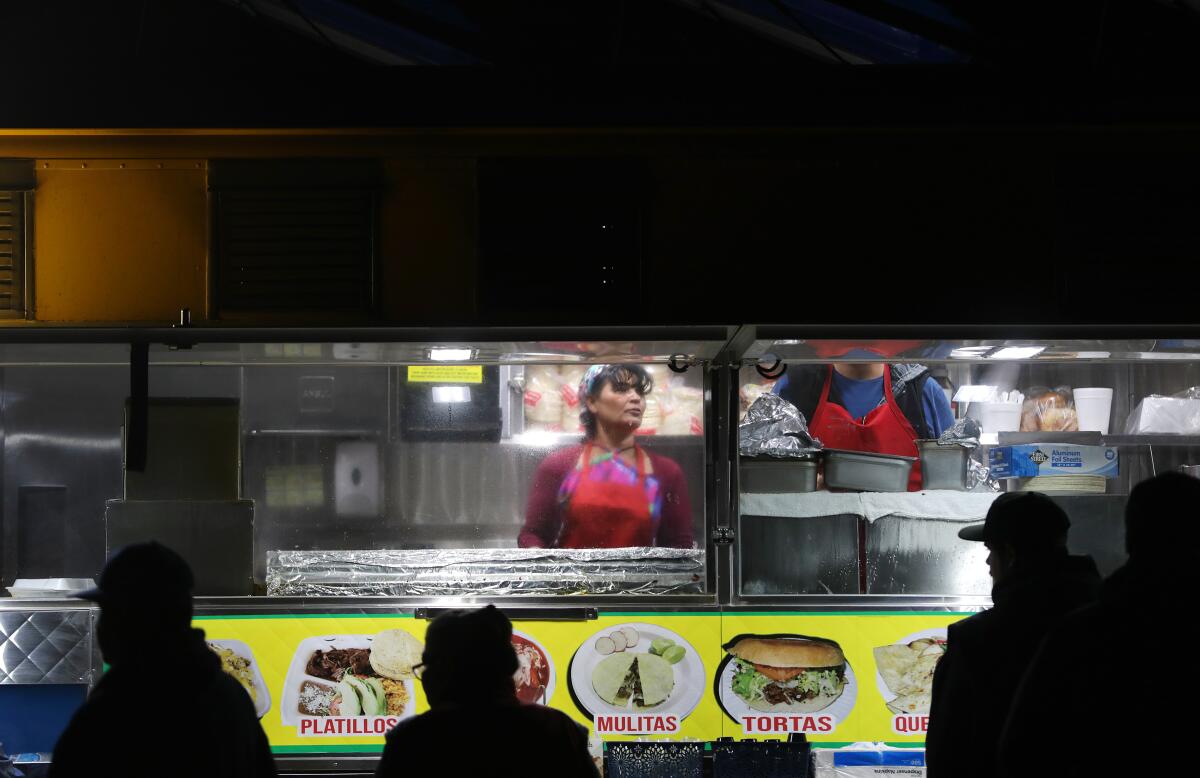
- Share via
In the high desert city of Hesperia, 80 miles northeast of Los Angeles, it was so cold on a recent night that the salsas outside the Tacos La Madrina food truck stiffened with frost.
The weather didn’t stop customers from lining up for tacos in the maw of winter, some wrapped in fleece blankets, others huddled near the truck for warmth.
The truck’s owner, a slight, intense woman in her late 40s named Maria Cárdenas, worked at full speed behind the grill, sweating in the 50-degree temperature.
“One time it got so cold, the shredded cabbage froze,” Cárdenas said with a laugh.
People line up for her al pastor, chile-blistered beef birria and her excellent tacos de tripas, slender tubes of offal that she serves half-crisp and half-tender.
Cárdenas is a rare figure in the taco world: a prominent taquera in an industry dominated by men.
Once seen as the lowbrow food of the working class, tacos have become Mexico’s most celebrated cultural export, transcending socioeconomic class and geographic borders.
In Los Angeles, tacos have made culinary stars out of chefs and business owners such as Roy Choi of Kogi BBQ, Teddy Vasquez of Teddy’s Red Tacos and Jorge Alvarez-Tostado of Tacos 1986. Tacos have the power to collapse cultural barriers, launch careers and bring money and renown.
But the people who stand to gain the most from making and selling them are still overwhelmingly male. Why aren’t there more high-profile taqueras?
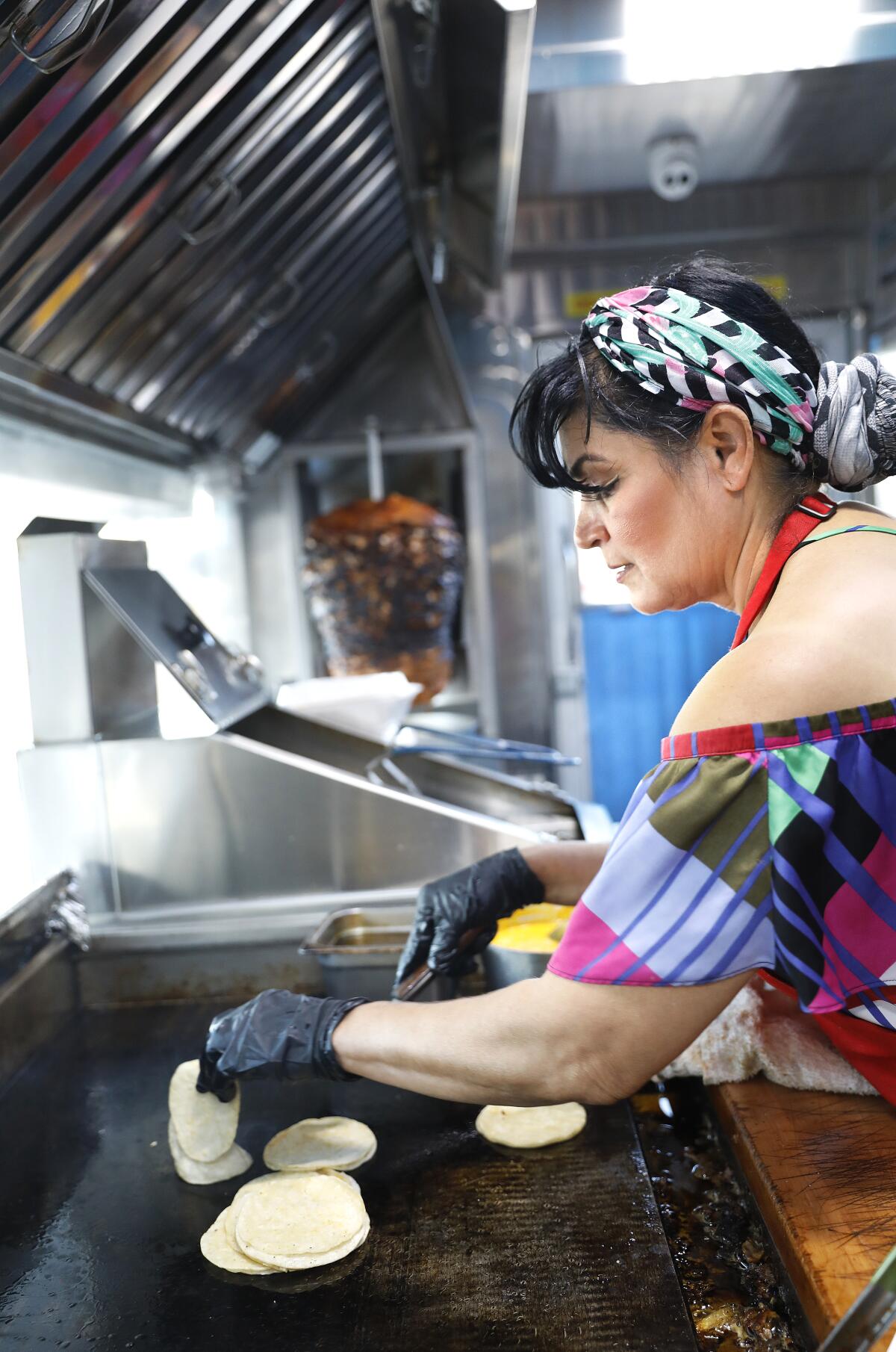
“It’s not an easy place for women. The hours are long. It keeps you away from your children,” Cárdenas told me recently.
She began to make tacos two decades ago, a career born of necessity.
When she was 22, her husband died unexpectedly, leaving her with three daughters under the age of 6.
She was living in Apatzingán, a hot, rainy city in the western Mexican state of Michoacán where the trees bloomed with tropical fruit but there was no work for a young widow with a sixth-grade education.
She moved to Los Angeles to stay with a sister and got a job as a cloth trimmer in a downtown garment factory. Then she picked up a second job cooking in a lonchera on Whittier Boulevard. It was the first time she had cooked for a living and she found the work an improvement over the brutally low pay of the garment factory.
She scraped together enough money to buy a taco cart and put three daughters through college selling tacos and burritos.
Recently, Cárdenas opened her first food truck (her sister, Esmeralda Cárdenas, put in half the money), a gleaming behemoth with her nickname, “La Madrina” (the godmother), emblazoned across the side. (Her original taco cart is parked in nearby Victorville, overseen by her sister.)
On the days she sells tacos — Thursdays through Sundays — she starts prepping at 3 a.m. before driving the 45 miles from where she lives in Ontario to the upper reaches of San Bernardino County, where she opens for business at 4 p.m. and sells until midnight, or whenever the meat runs out.
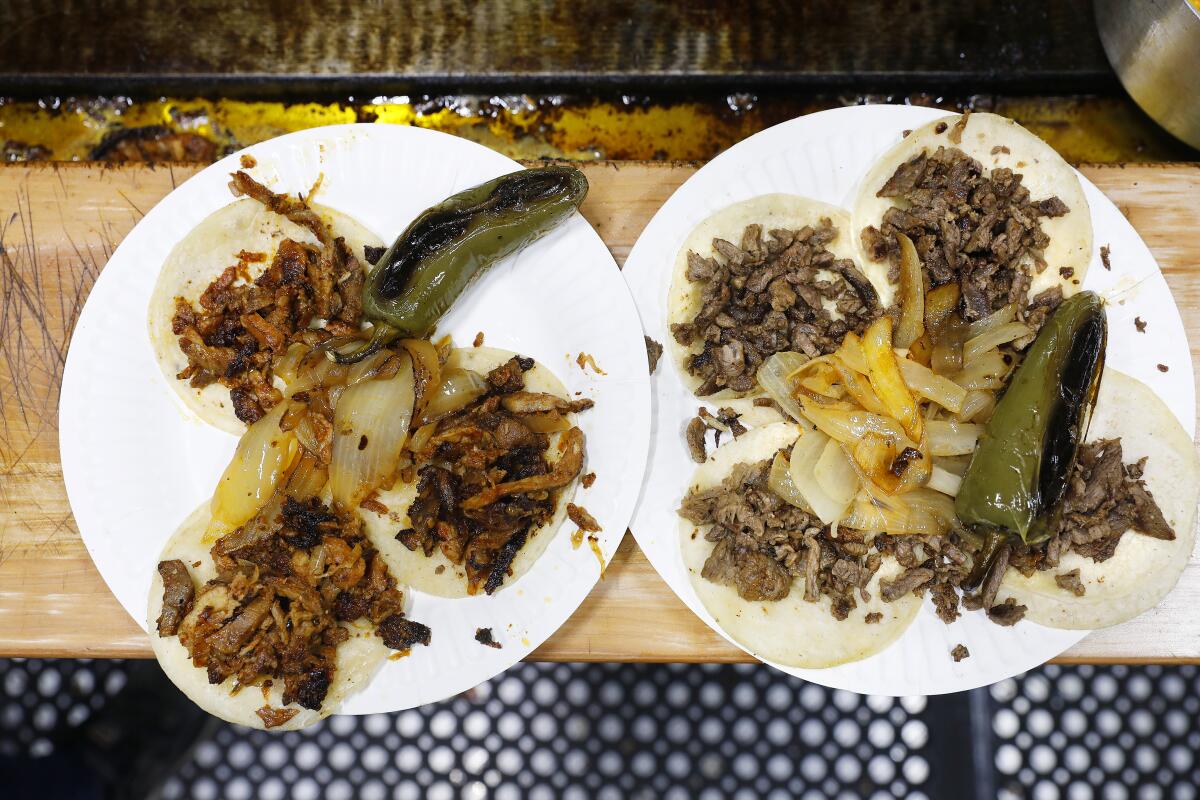
She picked the high desert to do business because someone told her the area needed more Mexican food trucks; the near-instant popularity of her operation proved them right.
The successful food truck launch represents a major turnaround in her life.
In 2013, her second marriage fell apart. She remembers calling the police to help escort her from the family home, taking only her son, the dog and a few personal belongings. “It was an abusive relationship in every way,” Cárdenas said.
The divorce left her insolvent. She moved in with her sister, where she still lives, sharing a room with her 15-year-old son, Victor.
She’s saving money to move to Hesperia, where she says people have been good to her.
On Jan. 10, she threw a grand-opening party for Tacos La Madrina. Crowds gathered in the gravel-lined desert lot on Main Street where she parks the truck. The local Univision news station interviewed her.
“Taqueros get most of the attention,” she said. “Never in my life did I expect I would be welcomed this way.
“It feels like destiny. I think some of us are destined to fall into this work. I never would have found this community if I wasn’t a taquera,” she said.
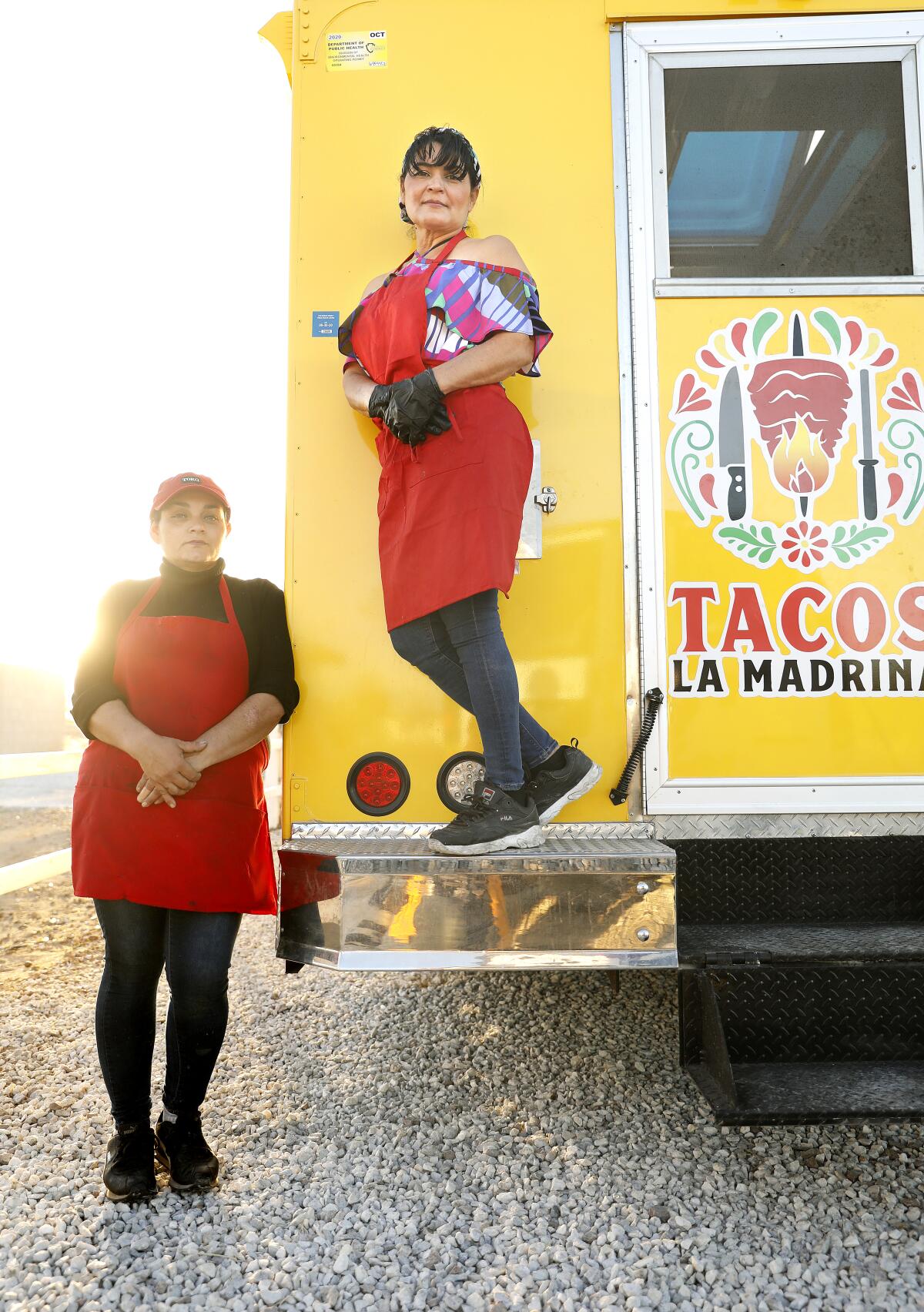
There have always been women like Cárdenas: self-made taqueras selling food for survival. Photographs of early 20th century Mexico City street life depict women, names unknown, selling tacos de canasta (“basket tacos”), the soft, steamed tacos stacked in and sold out of a cloth-covered basket.
Mexican women played a crucial but unsung role in the dish’s ubiquity. The work of turning corn into fresh tortillas — a grueling process involving grinding nixtamal on a stone metate into raw dough — defined daily life for generations of Mexican women.
But the popular image of the neighborhood taco maker is a male figure. In “Tacopedia,” a survey of Mexican taco culture by Deborah Holtz and Juan Carlos Mena published in 2012, the pictorial representation of “taco maker” is a mustachioed man in a white paper hat, the typical uniform of midcentury Mexican taqueros.
The basic architecture of the taco — a corn tortilla wrapped around meats or vegetables — is very old and probably rooted in Mesoamerican culture. Modern taco culture as we know it dates to 19th century Mexico, when the dish became recognized as working man’s food. The etymology of the word “taco” is hotly debated, but most historians pinpoint its modern usage to the silver mines of colonial Mexico, where the small parcels of paper-wrapped gunpowder that workers used to blast through ore were called “tacos.” The fried corn tortillas folded around vegetables that the workers ate became known as “tacos de mineros” (miner’s tacos).
The dish proliferated on the street corners of Mexico City in the early 20th century, a fast and convenient meal for urban workers. Their popularity spread throughout the country, and regional varieties flourished.
Neighborhood taquerias are typically high-visibility spaces on city corners or street stalls, a de facto stage for the chef. Not unlike American pit masters and smoked meats, men have become the public face of the dish.
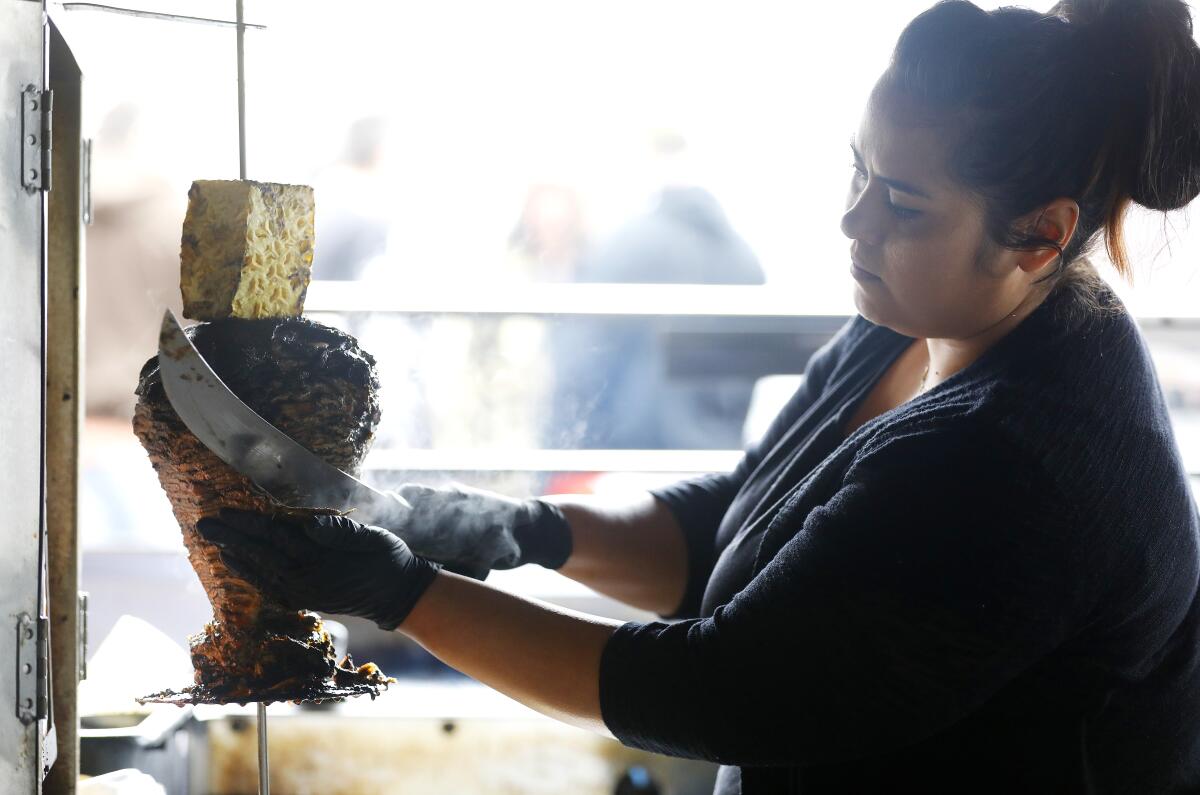
Today, taco festivals and media coverage tends to highlight the work of male taco makers.
“The taco scene is very male-dominated. Sometimes it’s discouraging,” Elvia Huerta told me recently.
Huerta makes up half of the L.A. taco-making outfit called Evil Cooks.
She and her partner, Alex Garcia, travel with their equipment and supplies in a black 1989 Dodge van that looks like the wheels of a touring punk band, cooking at various pop-up spots around Los Angeles, including their current residency at Row DTLA’s Smorgasburg. They cook in rock T-shirts and bandannas, sometimes stamping their handmade corn tortillas with their logo: a smirking, goateed cartoon devil.
Huerta grew up in a conservative Mexican home in El Sereno, the daughter of a factory worker and a stay-at-home mother. Her dad made $80 a week and somehow managed to put her through private high school.
“We were taught to value la escuela, hard work and job security,” she said.
An introverted kid who enjoyed baking, she enrolled at Le Cordon Bleu in Pasadena after high school and afterward landed a job managing a kitchen at UCLA.
“I had steady pay and excellent health benefits. I thought I was a UCLA lifer,” she said.
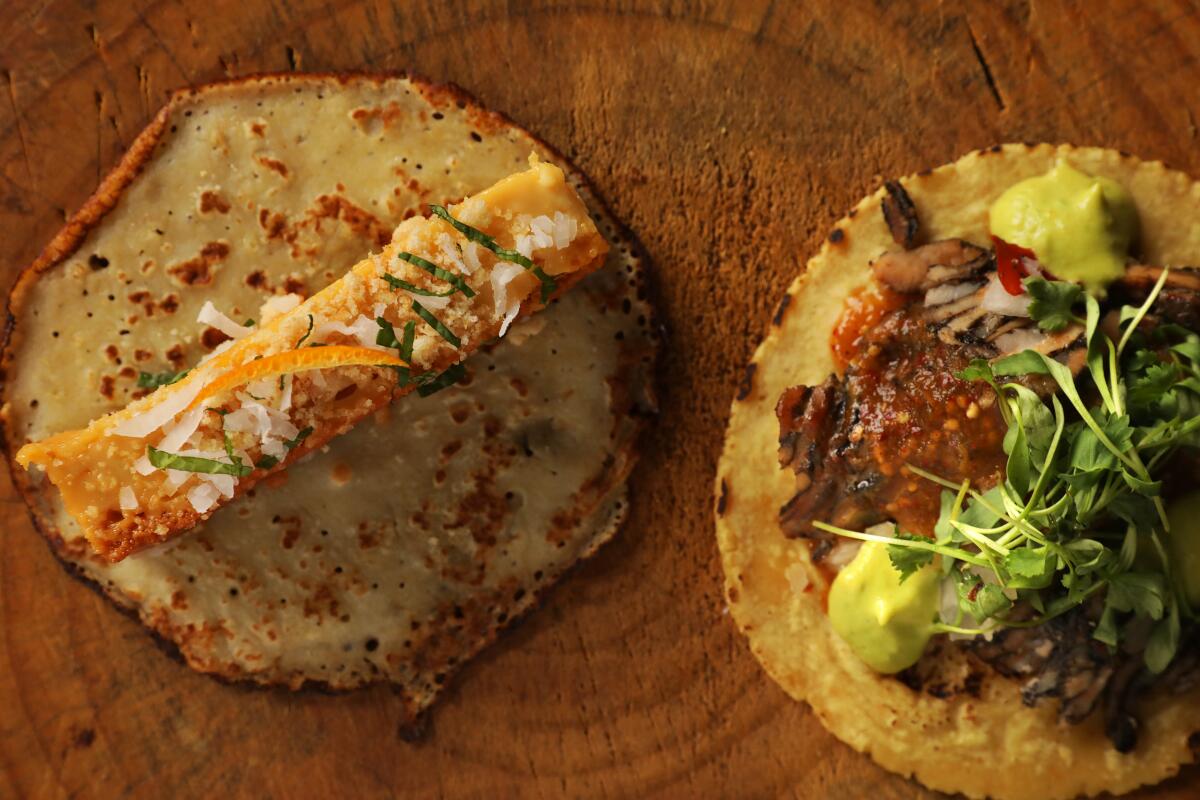
It was grueling work — her team fed more than 7,000 students — and some of her male subordinates didn’t like taking orders from a woman.
When she met Garcia, the two bonded over music and Mexican cooking. They began to organize pop-up dinners together.
For one year, she juggled 12-hour workdays at UCLA with her extracurricular cooking.
She quit her job in early 2019 to dedicate herself full-time to Evil Cooks, not telling her family at first for fear of being scolded.
Her parents have come around to her career as a taquera.
Together, Garcia and Huerta plot new dishes, culinary whimsies she refers to as her “pendejadas.”
The menu, which changes often, is thrillingly irreverent. Pork marinated in a recado negro chile paste is stacked up into a black “goth” trompo. A griddle-crisped torta layered with savory breaded cactus is billed as nopales a la milanesa. And for dessert: a citrus-tinged wedge of flan wrapped in a crepe-inspired tortilla.
There’s a performative aspect to taco making that favors men who know how to handle large knives in front of crowds.
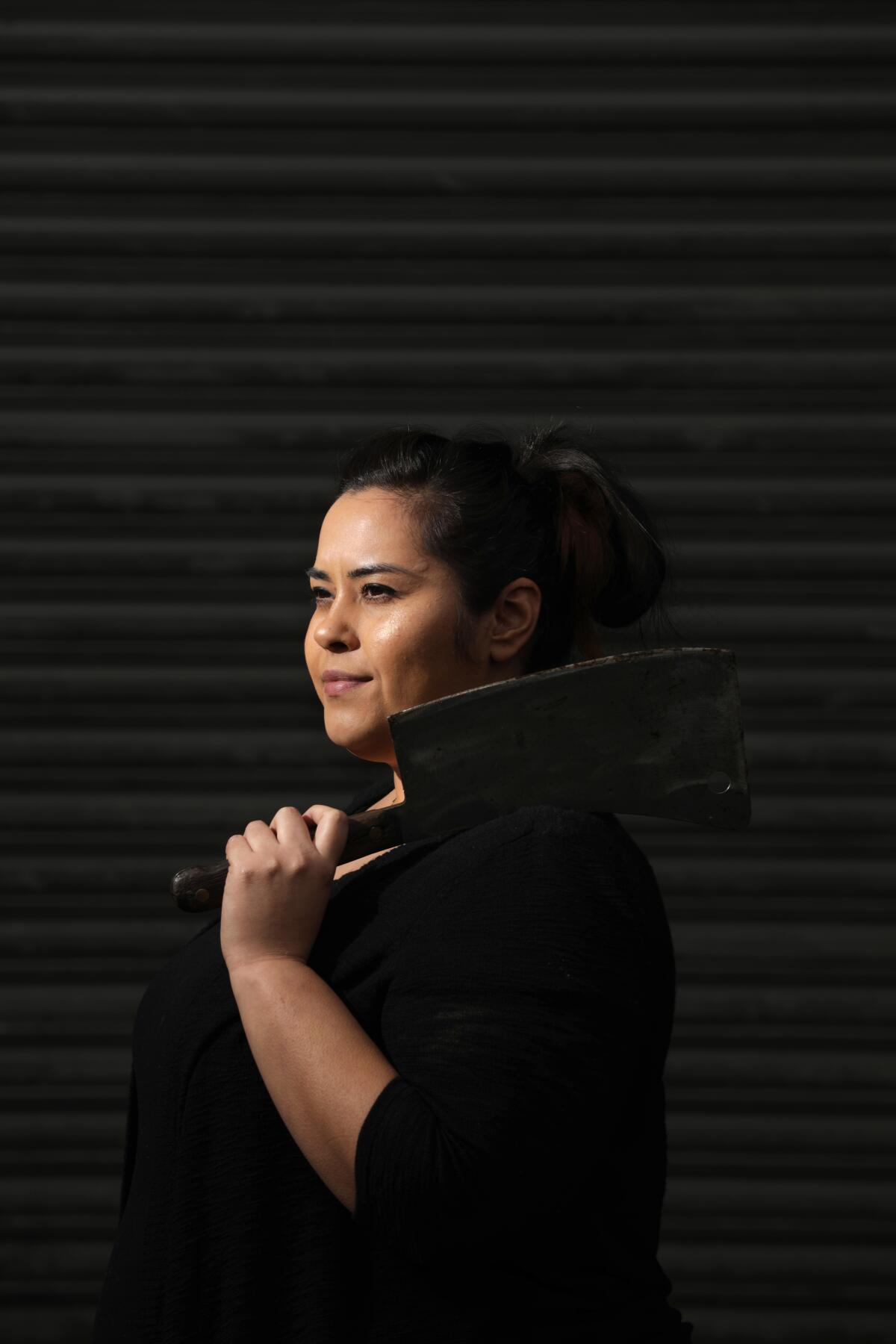
When Elvia Huerta cooks, she wields a metal blade spatula with the coolness of a practiced duelist.
Recently a customer stopped to take a picture of Evil Cooks at an event, but the fan wanted only Alex in the photograph. Sometimes people assume Huerta is there to assist or clean.
She used to shrink into the background at events but now aims to stand front and center.
“It’s time for women to be in the picture. It’s long overdue,” she said.
On a traffic-choked corner near the intersection of Lorena and Opal streets in Boyle Heights, not far from where Huerta grew up in El Sereno, Rosario Rios is the neighborhood’s most recognizable taquera.
Every Saturday at 6 a.m., donning a hairnet and plastic apron, she sets up two polished steamers full of tacos at her long-running food stand, Tacos de Canasta o Al Vapor Rosario.
The dewy, palm-size tortillas are filled with precooked fillings including mashed beans and potatoes or lightly spicy shredded beef. They are a local breakfast staple, especially the coveted chicharrón in a spicy green salsa, which sells out before the morning fog burns off.
On a recent morning, Rios was polite but bleary-eyed. She had been up since midnight preparing 850 tacos al vapor for two private events she was catering later in the day.
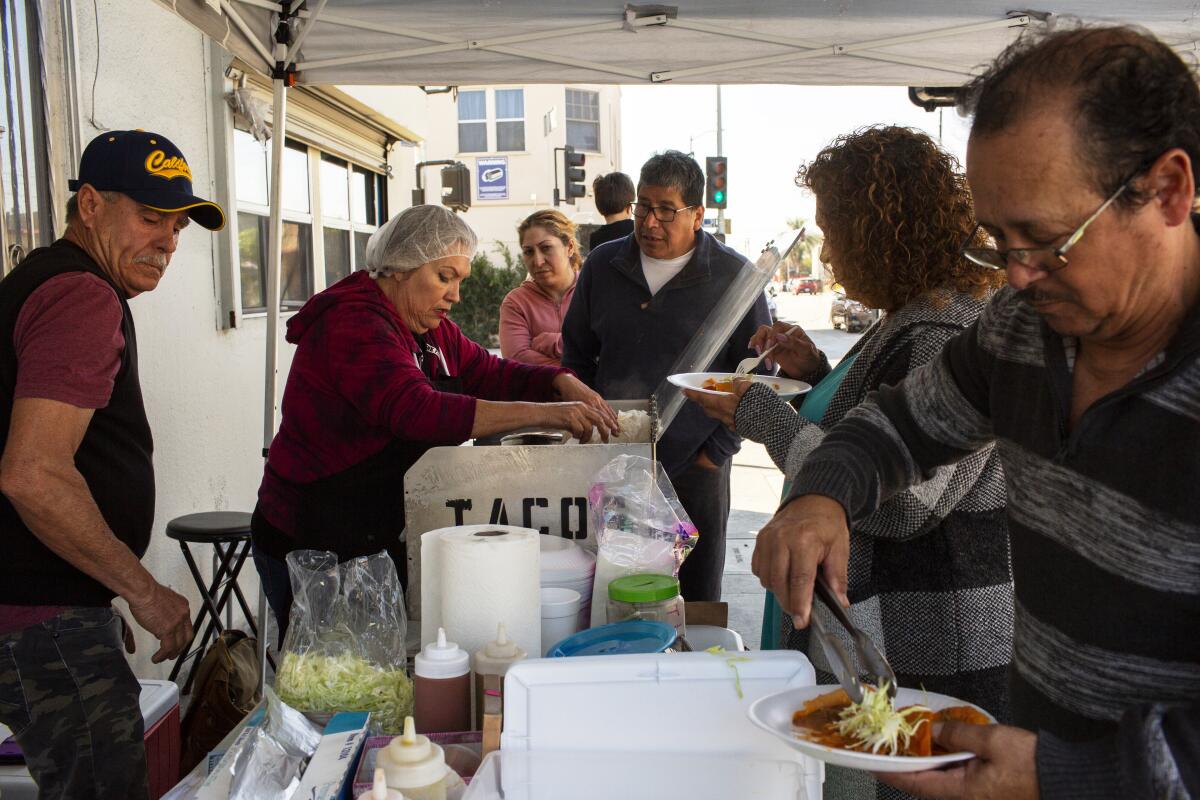
She started selling tacos al vapor — steamy, oil-slicked tacos kept warm in her hand-polished steamers — because they require less equipment for street-side vending, and they’re less common around Los Angeles than other varieties.
“La necesidad me hizo aprender hacer este taco,” Rios said. Necessity forced me to learn to make this taco.
In the early 1980s, Rios was a young mother of three running a small fonda in Jocotepec, Jalisco, when her husband announced he was leaving the family.
“He dropped me off at my father’s house and said: ‘I don’t love your daughter anymore. I have another woman that I love more.’”
A family friend offered her a temporary job cleaning houses in Los Angeles. She left her children in the care of an older sister and journeyed north to earn money.
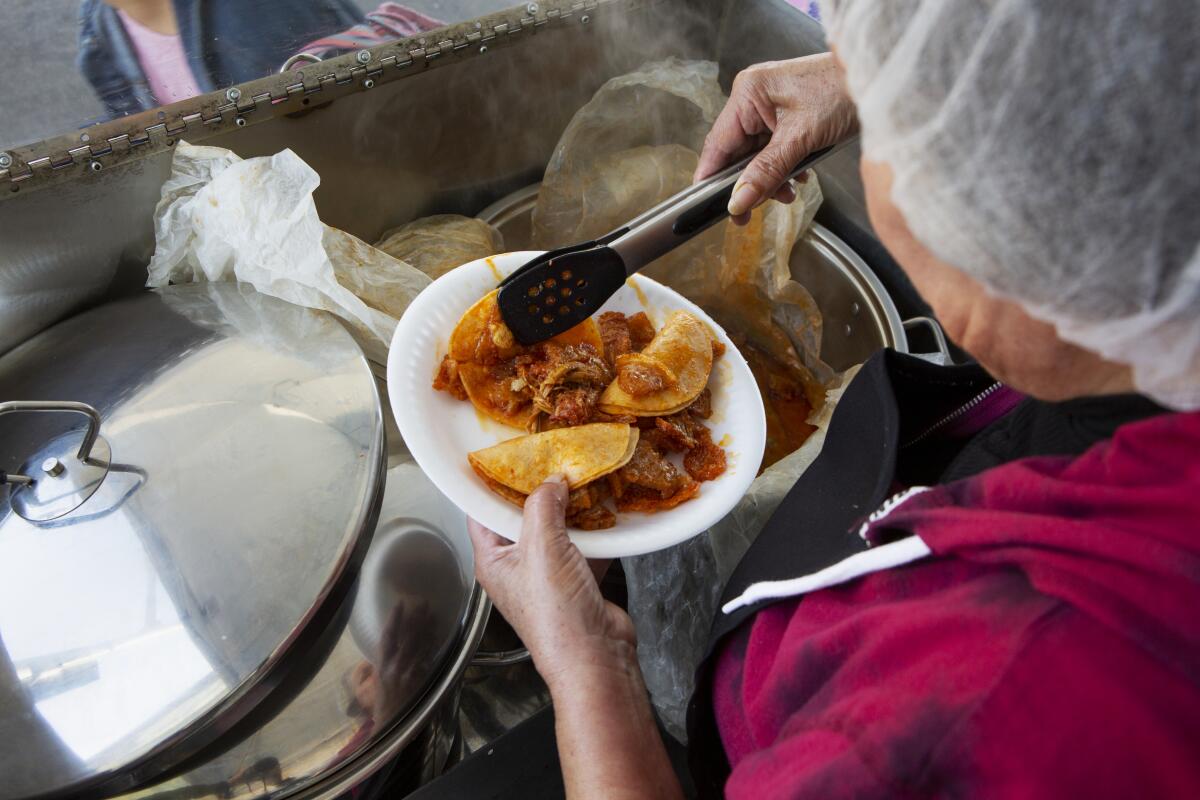
She was supposed to be in Los Angeles for only a month. That was more than 30 years ago. She stayed when she realized she could make enough money in one day to feed her children for a week.
She floated among jobs: housekeeper, seamstress, elder care assistant, waitress. There were bosses who wouldn’t let her take breaks, and barely kept her fed, she said.
“You can make more money here but you also suffer more,” Rios said. “People treat you poorly when they know you have nowhere to go.”
She entered the world of taco making circuitously, never guessing at her fate.
“The first time I tried to make these tacos, they fell apart. They turned into chilaquiles,” she said.
It took time to master the form but it was worth the effort to be her own boss.
“I get to work at my own pace. I set my hours. If it turns out bad, I only have myself to blame,” Rios said.
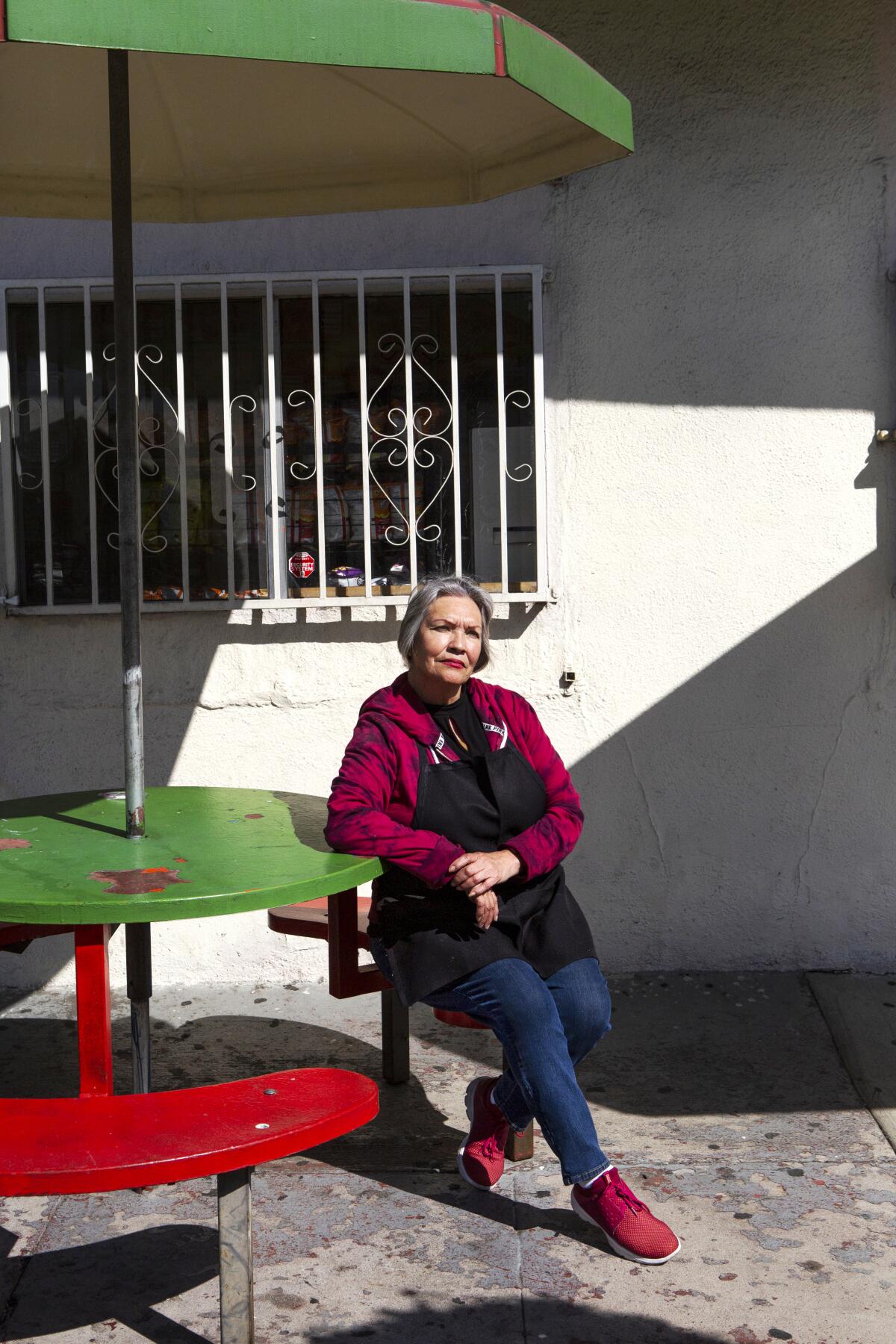
For Rios, and fellow taqueras Maria Cárdenas and Elvia Huerta, the taco business has conferred the kind of financial and professional agency historically denied to women. It has given them freedom.
All three are optimistic, cautiously so, about the future of women in the industry.
The taquera’s life is full of risks, Rosario Rios told me recently. Some days are slower than others, and there’s no paid time off. The physical nature of the work is punishing.
“My hands ache all the time,” Rios said.
The worst is not feeling safe.
Two months ago, in broad daylight, there was a shooting near the spot on Lorena Street where Rios makes her living as a taquera.
She briefly considered retirement. The next weekend she was back on her corner, selling tacos.
Tacos La Madrina
14968 Main St., Hesperia; also at 14543 Hesperia Road, Victorville
Evil Cooks
Various locations. Sundays at Smorgasburg LA.
Tacos de Canasta o Al Vapor Rosario
1154 S. Lorena St., Los Angeles
More to Read
Eat your way across L.A.
Get our weekly Tasting Notes newsletter for reviews, news and more.
You may occasionally receive promotional content from the Los Angeles Times.










